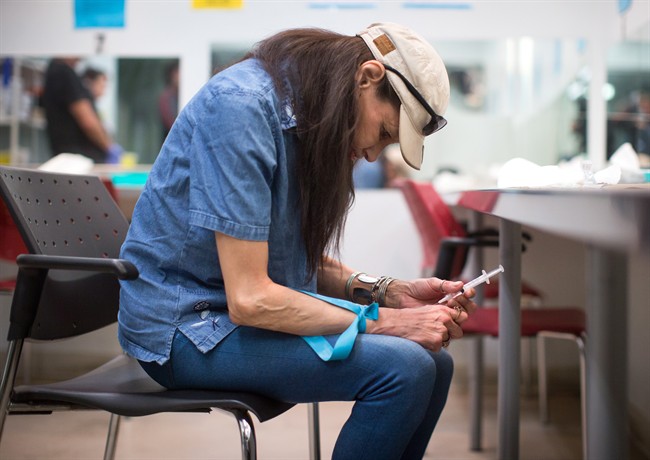The caller on the other end of my phone could not believe what he was hearing. We were talking about supervised injection sites and the continuing opioid crisis. Someone mentioned how one of the side effects of using opioids might be hopeless constipation. “We don’t give a crap,” he said, angrily, “if some addict can’t take a crap.”

Little did I know I was about to be in that very situation.
I was just beginning my vacation and expecting a nice relaxing time. I rolled over to get out of bed and felt pain like never before in my left leg. The pain was so intense I could not get out of bed. My wife, Marg, helped me get up but I could not stand on that leg. I knew I had to get to a doctor, and used some old crutches from a broken leg many years ago to get to the car. I had heard other people try to describe extreme pain and now I had an idea of what they were talking about. At the hospital they tried to put me through an MRI, but the pain was so bad I could not lie still long enough for them to get a clear shot of what was happening.
I was given an injection of something that killed the pain and they were able to determine that the pain in my leg was caused by a pinched nerve in my lower back. I would need an operation. Now, I would find out, the hard and painful way, why so many people are complaining about long wait lists for surgery. The operation would not happen for a couple of months.
I was kept in the hospital for over a week as they tried several different painkillers. Some, I had seen on TV with that terrible list of side effects. When I asked about those effects, I was told the pharmaceutical companies only had to mention them if they happened to “one-in-a-million” users. I wondered if I was the one in a million that had this kind of pain. There was one painkiller that worked, but they did not continue it because it was expensive and not covered under Alberta health care. Finally, they settled on a prescription for hydromorphone and I went home. I was still feeling some pain, but I felt I could handle it.
They made me leave the hospital in a wheelchair, as was their policy, and I used crutches at home to keep the weight off that painful leg. Later, walking across the parking lot to my doctor’s office, someone recognized me from my TV editorials and said, “Hey, you’re Bob Layton – why the crutches? A skiing accident? I’ll bet it was a skiing accident, right?”
I just tried to smile.
“Yup, I thought so,” he said.
I could not drive, so Marg was getting me to work at 3 a.m., which is when my shift begins, and helping me up a flight of stairs to the second floor.
Eventually, the pain become more bearable and I was able to get around using a cane.
Another street recognition: This time, the fellow stared at my cane and said, “Oh, Bob, I didn’t know you had retired.” Funny, the first perceptions people can have without first seeking proper information. Just like those who think addicts are the only ones who get constipated from opioids.
While the pain was manageable, this opioid medication left my mouth terribly dry and my guts terribly constipated. It was like trying to pass a brick. Not a good thing for a broadcaster. Drinking copious amounts of water before a newscast did not seem to help all that much and it felt like my lips and tongue were sticking together at times. All that water and a prescribed laxative was not helping either. I was having a problem at both ends of my body.
I hoped the audience was not noticing my dry mouth.
It was sports legend, Bryan Hall, who did. He walked over to me after a broadcast and asked, “Are you on some kind of medication? I can hear something that is not quite you.”
I told him what was going on and he seemed to understand what I was talking about.
I knew I could not continue on like this.
My doctor had told me I would not be on enough of this medicine to get addicted, but it would be slow process getting off it, maybe close to a month. He said that as the time for my operation came he would lessen the amount of medication again and again, until I was completely weaned.
It was a Friday, and while I had the weekend off, I could not bear the thought of going to work on Monday and not sounding my best.
I had several pills to take at 2 a.m. when I rose for work, at noon and at bedtime. Despite my doctor’s caution to never miss a medication and to come off this stuff slowly, after thinking about it, I did not not take my nighttime meds.
The next morning I did not feel any worse and the pain had not increased. I went without my pills that day and retired without them Saturday night. The pain had not returned but I was feeling odd – just some kind of feeling, maybe all in my head, that something was not right. I drifted off to sleep.
The next thing I remember was in the wee hours of the morning. I had woken up a little cold because my bedclothes were soaked. I was sweating and my wife was standing beside my side of the bed shouting something. I was not sure what she was saying but I finally understood her as she asked loudly, “What’s wrong with you? You are shaking so hard you are shaking the whole bed!”
She looked scared and I admitted I had stopped taking the medication and explained why. Marg was not sure if I had done the right thing but was prepared to support me. During the day, the shaking subsided and I quit sweating.
My doctor was surprised. “You just quit? Just like that?” He had heard of a few people doing that but not many.
I made do with a lesser pain medication and soon it was time for the operation. A tiny incision in my back and it was all over. No more pain. No more cane.
I do not pretend to know what it is like for a person totally hooked on opioids who has lost everything and is now living on the street. My brush with that medication was relatively minor. I am, however, now able to empathize with those who need help.
There is a lot of controversy over what some call “safe” and others call “supervised” injection sites. I was appreciative of the support I had during my time of need and would not deny it to others, especially if it leads to the opportunity to overcome the addiction.
At the same time, however, I would like to see more resources provided at the other end of the problem, by making a trafficker’s future as tentative as his victim’s.
Bob Layton is the news manager of the Corus Edmonton group of radio stations and a commentator for Global News.







Comments